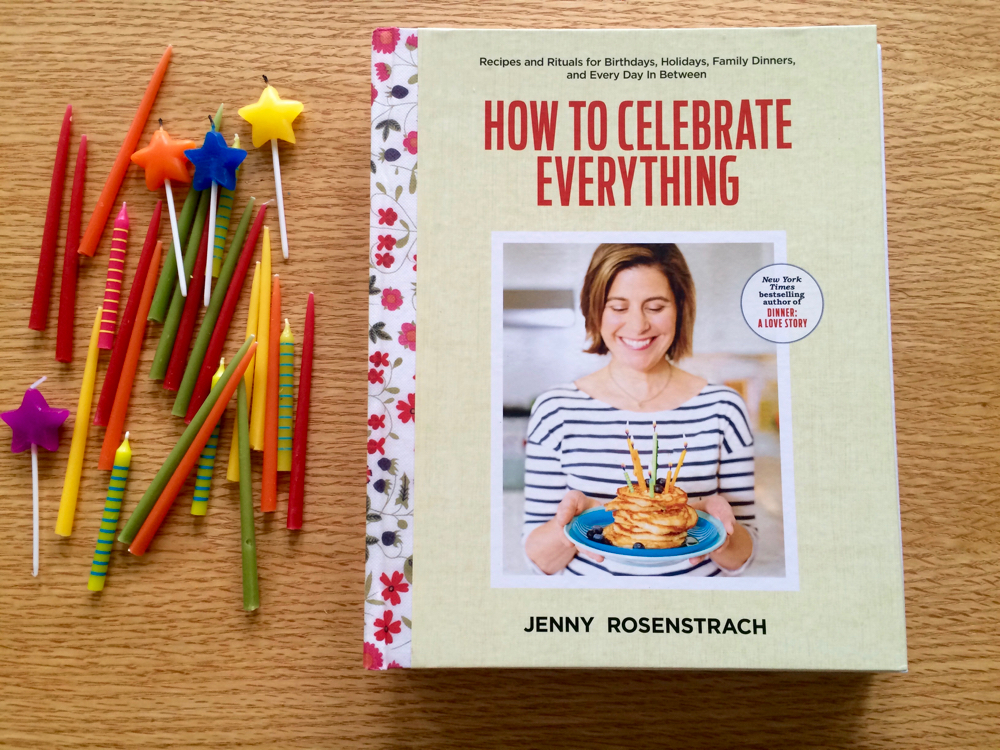In my family, the tradition of the Birthday Parade goes back at least four generations ... with the fifth generation being added this year. The birthday honoree sits at the table after dinner, all the lights out, while the rest of the household scurries around lighting candles on the cake, digging out handmade cards and presents, and forming a line (always shortest to tallest, with the cake at the very end) in another room to form “the Parade.” The birthday song begins, and the parade works its way back to the table, lighting up the dark room in the process.
This is how we do birthdays. I rarely remember the flavor of the cake, or what kind of ice cream (but if it wasn’t mint chocolate chip it must have been someone else’s birthday). What I do remember is the feeling of being the important one that day, the one everyone else was celebrating.
This is a memory worth having, in a world where things change, kids grow up, grandparents age, and everything can seem a little less special.
Our human craving for rituals
According to Jenny Rosenstrach, author of the cookbook How to Celebrate Everything: Recipes and Rituals for Birthdays, Holidays, Family Dinners, and Every Day in Between, those moments are more than just good memories; they can turn into rituals that help us bond as family units.
“Families crave rituals,” she writes, and her book was designed to help us slow down and savor the everyday moments, creating a little everyday magic in the process. They may even be an important part of our emotional health, notes Karan Johnson of the BBC.

“Rituals occur surprisingly often within our everyday lives. It’s believed that we form rituals based on our values,” she writes. “But rituals go further than helping us to live out our values. They may also make us less anxious.
“Ritualistic practices can help to bring a degree of predictability to an uncertain future,” Ms. Johnson continues, citing a 2017 study. “They convince our brains of constancy and predictability as buffers against uncertainty and anxiety.”
Magical moments don’t need to be complicated
Brain science aside, the ideas in Ms. Rosenstrach’s book are resonating. Popular lifestyle blogger Savvy Mom says she’s “obsessed” with the book and its inspiring recipes and ideas.
“Unlike most cookbooks, this one reads more like a story, and is one you’ll want to curl up and consume cover to cover,” she writes. “While the rituals and holidays covered are specific to Jenny’s own family, I like to think they’re familiar enough that you can see your own family within them somewhere.”
“I write about real recipes, made in a real kitchen, for real people, specifically my two teenage daughters, and husband, Andy, a book editor,” Ms. Rosenstrach writes on her website. “None of the dishes you see here are plated by a team of food stylists or dreamed up in a test kitchen because a focus group determined that, say, turmeric was trending.”
The ideas in the book are designed to be participatory, no matter your skill level with entertaining or prowess in the kitchen. It doesn’t take any special talent to put some candles on top of a stack of pancakes on a chilly Saturday morning … just a willingness to get a little silly and lean in to celebrating life as it comes.
“What I hope to illustrate in How to Celebrate Everything is how family rituals do not have to have their own Hallmark aisle or be accompanied by a six-course bacchanalia in order to be meaningful,” Ms. Rosenstrach continues. “They don’t have to be perfect, and they don’t have to be huge. They just have to be yours.”
Ultimately these everyday rituals help remind us we hold a special place as a member of the household … whether with the families we were born into, or the ones we choose to create … and we don’t need to wait for a special occasion to celebrate that.
Ready to start some new everyday rituals in your family? Visit Ms. Rosenstrach’s website Dinner: A Love Story for some inspiration and information on buying the book. You can also sign up for her newsletter, full of inspiration and more fun ideas.
